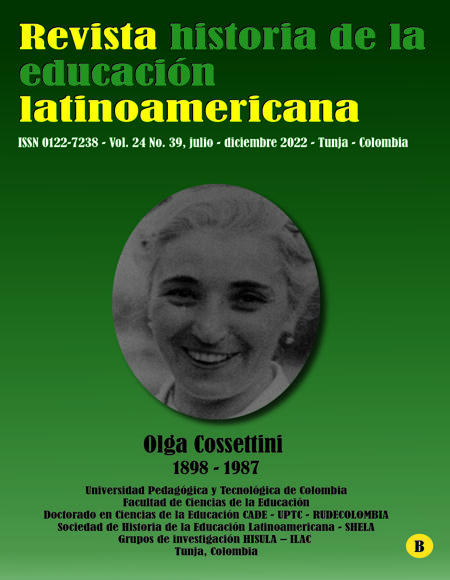The trajectory of the network of studies on the implementation of educational public policies

Abstract
Objective: this article presents the trajectory of the development of a network of researchers that emerged in Brazil to deepen and expand a more recent strand of analysis of educational public policies, the analysis of policy implementation. REIPPE is a social network that brings together researchers and, more recently, managers, other education professionals, and graduate students interested in a particular field of knowledge.
Originality/contribution: The contribution is the sharing of a network organization experience, which aims to stimulate further studies on the different ways of grouping researchers, which has been strengthened in recent years with the creation of research groups, research in groups, collaborative networks, networks of researchers and observatories.
Method: this is an experience report, with a historical approach, which sought to rescue the reasons why the network was formed and how it has been constituted since 2014, the year of its creation. The course of existence of the network was elaborated from its creation; its dynamics and identity; strategies to institutionalize; governance mechanisms; the promotion of activities aimed at strengthening the countryside in Brazil; the dissemination of content and the engagement of the interested public.
Strategies/information collection: a documentary survey was carried out based on the following sources: (1) two management reports produced by the network (2019-2020) and (2020-2021); (2) visits to your website; (3) visits to your Facebook page and YouTube channel; (4) academic production linked to research associated with its members (theses, dissertations and indexed articles); (5) Minutes of Meetings and (6) Personnel Records.
Conclusions: The analysis of the compiled data reveals that, since its foundation, the network has been strengthened and become a reference for researchers who deal with the issue of implementation, bringing together theoretical perspectives and research methodologies for the study of policies and programs in the field of education. The data also indicate that the network's activity has grown (accesses, clicks, and the number of subscribers), along with its academic production, reflecting in the increased engagement of the interested public, including organizations that finance and implement educational programs.
Keywords
networks, social networks, implementation of educational policies, educational policies, educational research
Author Biography
Breynner Ricardo de Oliveira
Doutor em Educação, Universidade Federal de Ouro Preto. Grupos de Pesquisa: GPPublica[e]s e LAP2D. breynner@ufop.edu.br
Fabiana Silva Fernandes
Doutora em Educação. Fundação Carlos Chagas, fsfernandes@fcc.org.br
Ana Cristina Prado de Oliveira
Doutora em Educação, Universidade Federal do Estado do Rio de Janeiro. Grupos de pesquisa: POGEFE e GESQ, ana.oliveira@unirio.br
Naira da Costa Muylaert Lima
Doutora em Educação. PUC-Rio. Grupo de pesquisa: LAEd; naira@puc-rio.br
References
- Ball, Stephen e Bowe, Richard. "Subject departments and the 'implementation' of national curriculum policy: an overview of the issues", Journal of Curriculum Studies, v. 24, no. 2 (1992): 97-115.
- https://doi.org/10.1080/0022027920240201 DOI: https://doi.org/10.1080/0022027920240201
- Bulgacov, Sergio e Verdu, Fabiane Cortez. "Redes de pesquisadores da área de administração: um estudo exploratório", Revista de Administração Contemporânea [online]. v. 5, no. spe (2001): 163-182.
- https://doi.org/10.1590/S1415-65552001000500009 DOI: https://doi.org/10.1590/S1415-65552001000500009
- Castells, Manuel. A Sociedade em Rede. A era da informação: economia, sociedade e
- cultura, v. 3. São Paulo: Paz e Terra (2000).
- Leite, Denise et al. Avaliação de redes de pesquisa e colaboração. Avaliação: Revista da Avaliação da Educação Superior (Campinas) [online]. 2014, v. 19, n. 1 [Acessado 29 Dezembro 2022], pp. 291-312. Disponível em: <https://doi.org/10.1590/S1414-40772014000100014>. Epub 20 Mar 2014. ISSN 1982-5765. https://doi.org/10.1590/S1414-40772014000100014. DOI: https://doi.org/10.1590/S1414-40772014000100014
- Lévy, Pierre. Cibercultura. São Paulo: Editora 34 (2009).
- Lévy, Pierre. A inteligência coletiva: por uma antropologia do ciberespaço. 2. ed.
- São Paulo: Loyola (2009).
- Mendes, E. G.; Tannús-Valadão; G.; D'affonseca, S. M. Impactos e desafios das redes de pesquisa: o caso do Observatório Nacional de Educação Especial. Revista Teias v. 17, n. 46. jul./set. 2016, p. 5-22. https://doi.org/10.12957/teias.2016.25891
- https://doi.org/10.12957/teias.2016.25891 DOI: https://doi.org/10.12957/teias.2016.25891
- Oliveira, Breynner; Martins, Lídia; Duarte, Adriana. Interação no ciberespaço e formação de professores: análise da sala de interação virtual do programa escola de gestores na Universidade Federal de Ouro Preto. Revista Ibero-Americana de Estudos em Educação, Araraquara, v. 12, n. esp. 2, p.1441-1461, ago (2017). Disponível em: <http://dx.doi.org/10.21723/riaee.v12.n.esp.2.10078>. E-ISSN: 1982-5587.
- https://doi.org/10.21723/riaee.v12.n.esp.2.10078 DOI: https://doi.org/10.21723/riaee.v12.n.esp.2.10078
- Portugal, Silvia. Contributos para uma discussão do conceito de rede na teoria sociológica. https://eg.uc.pt/bitstream/10316/11097/1/Contributos%20para%20uma%20discuss%C3%A3o%20do%20conceito%20de%20rede%20na%20teoria%20sociol%C3%B3gica.pdf (10/03/2022).
- Reippe, Rede de Estudos sobre Implementação de Políticas Educacionais. Relatório Técnico Parceria Estratégica (2020).
- Reippe, Rede de Estudos sobre Implementação de Políticas Educacionais. Relatório Técnico Parceria Estratégica (2021).
- Silva, A. A. da, Amaral, C. T. do ., & Almeida, L. B. de . (2022). Redes de Pesquisa em Educação e Colaboração Científica. Ensino Em Re-Vista, 29(Contínua), e002. https://doi.org/10.14393/ER-v29a2022-2
- https://doi.org/10.14393/ER-v29a2022-2 DOI: https://doi.org/10.14393/ER-v29a2022-2
- Silva, Marcelo. Educação on line. São Paulo: Edições Loyola (2012).
- Vermelho, Sônia Cristina, Velho, Ana Paula Machado e Bertoncello, Valdecir. "Sobre o conceito de redes sociais e seus pesquisadores", Educação e Pesquisa [online]. v. 41, no. 4 (2015): 863-881.
- https://doi.org/10.1590/s1517-97022015041612 DOI: https://doi.org/10.1590/s1517-97022015041612
